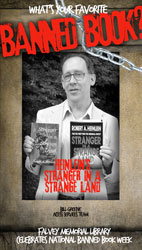Banned Books: Lord of the Rings, Babar & The Rights of Man
Many people stopped by the library desk in October to ask for information about the Falvey Banned Books display. Here are the books’ stories, accompanied by the names of the library staff members who selected these titles.
Stranger in a Strange Land by Robert A. Heinlein
Selected by Bill Greene

William Greene
In 2004, challenged but retained in the South Texas Independent School District in Mercedes, Texas. Parents objected to the adult themes, sexuality, drugs and suicide, found in the 1962 Hugo Award-winning novel being used in a summer science academy curriculum. (Source: Banned Book Week, Marshall University )
Beloved by Toni Morrison
Selected by Judy Olsen
Challenged at the St. Johns County Schools in St. Augustine, Fla. (1995). Retained on the Round Rock, Texas Independent High School reading list (1996) after a challenge that the book was too violent. Challenged by a member of the Madawaska, Maine School Committee (1997) because of the book’s language. Challenged in the Sarasota County, Fla. schools (1998) because of sexual material. (Source: 2007 Banned Books Resource Guide by Robert P. Doyle.)
The Lord of the Rings, by JRR Tolkien
Selected by Luisa Cywinski
Considered satanic, the trilogy was burned in Alamagordo, New Mexico (2001) outside Christ Community Church, along with other Tolkien novels. (Source: 2007 Banned Books Resource Guide by Robert P. Doyle)
The Rights of Man by Thomas Paine
Selected by David Burke
“Having spent 12 years in America, during which time he championed the cause of the American Revolution in such notable writings as Common Sense and The Crisis, Paine returned to his native England in 1787… . His interest in the French Revolution, however, took him to France in 1789, from where he began to write enthusiastic letters regarding events in France to Edmund Burke. The latter did not share Paine’s enthusiasm, fearing that it might spread to England. So concerned was Burke that he published in 1790 his Reflections on the Revolution in France, an attack on the leaders and principles of the revolution and on the violence and excesses that resulted.
It was not that Burke decried the concepts of liberty and freedom; it was rather that he felt that these concepts would have a better chance of being realized in a nation with a settled system of law and justice than in one where the uncontrolled fury of the masses would lead to chaos and violence.
Paine’s response to Burke was The Rights of Man. The Rights of Man had an enormous circulation–so much so that the British government, uneasy about its effects, sought to suppress it.” (Reference Guide to English Literature, 1991)
A Separate Peace by John Knowles
Selected by Joanne Quinn

Joanne Quinn
Challenged in Vernon-Verona-Sherill, New York School District (1980) as a “filthy, trashy sex novel.” Challenged at the
Fannett-Metal High School in Shippensburg, Pa. (1985) because of its allegedly offensive language. Challenged as inappropriate for high school reading lists in the Shelby County, Tenn. school system (1989) because the novel contained “offensive language.” Challenged at the McDowell County, N.C. schools (1996) because of “graphic language.” (Source: 2007 Banned Books Resource Guide by Robert P. Doyle.)
The Story of Babar by Jean De Brunhof
Charged with being “racist” and “extol[ling] the virtues of a European middle-class lifestyle and disparag[ing] the animals and people who have remained in the jungle,” The Story of Babar has been labeled Eurocentric by its detractors (1991).
Maurice Sendak’s classic Where the Wild Things Are has been challenged for involving “witchcraft/supernatural elements.” (“Censored: Wielding the Red Pen,” University of Virginia Library, 2000.)
Selected by Susan Markley
Brideshead Revisited by Evelyn Waugh
Selected by Darren G. Poley
In 2005, legislation proposed in Alabama would prohibit the use of public funds for the “purchase of textbooks or library materials that recognize or promote homosexuality as an acceptable lifestyle.” The bill also proposed that novels with gay protagonists and college textbooks that suggest homosexuality is natural would have to be removed from library shelves and destroyed. The bill would affect all Alabama school, public and university libraries. While it would ban books like Heather Has Two Mommies, it could also include classic and popular novels with gay characters such as Brideshead Revisited, The Color Purple or The Picture of Dorian Gray. (Source: Banned Book Week, Marshall University)
Fahrenheit 451 by Ray Bradbury
Selected by Robin Bowles
“I will not go gently onto a shelf, degutted to become a non-book.” Ray Bradbury, Author’s Afterword, Fahrenheit 451
Ironically, Fahrenheit 451, an indictment of censorship, was itself censored by its publisher for thirteen years before Bradbury himself became aware of that. In 1967, Ballantine published an expurgated version of the novel to be used in high schools. Such words as “hell,” “damn” and “abortion” were eliminated. (Source: The mutilation and rebirth of a classic: Fahrenheit 451)
Player Piano by Kurt Vonnegut
Selected by Alfred Fry
Banned in the Bay County School District, Panama City, Florida (1986) by the Superintendent of Schools Leonard Hall, who established a review process that resulted in the elimination of “64 classics” from Bay County classrooms and school libraries. (Source: Banned Books: Literature Suppressed On Political Grounds by N.J. Karolides)
Harry Potter Series by J. K. Rowling

(l. to r.) Natalie Tomasco and Alice Bampton
Selected by Natalie Tomasco and Alice Bampton
(2000) Zeeland, Michigan School Superintendent Gary Feenstra removed the books from the school library shelves, saying fantasy books about a boy wizard cannot be on school library shelves or be read aloud in class. (Source: Chicago Tribune)
Article and graphics by Joanne Quinn, Bill Greene, Judith Olsen, Alfred Fry and Laura Hutelmyer
1 Comment »
RSS feed for comments on this post. TrackBack URI
Thanks for the fascinating reading, Judy. The list will be my next summer’s reading.